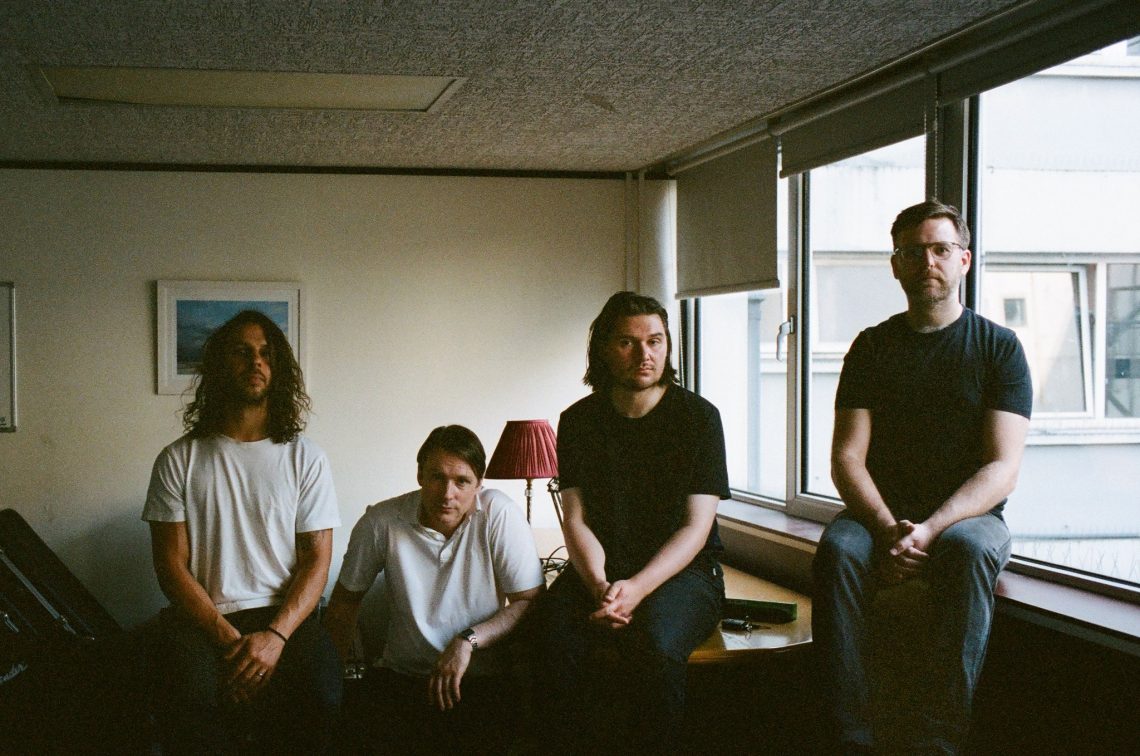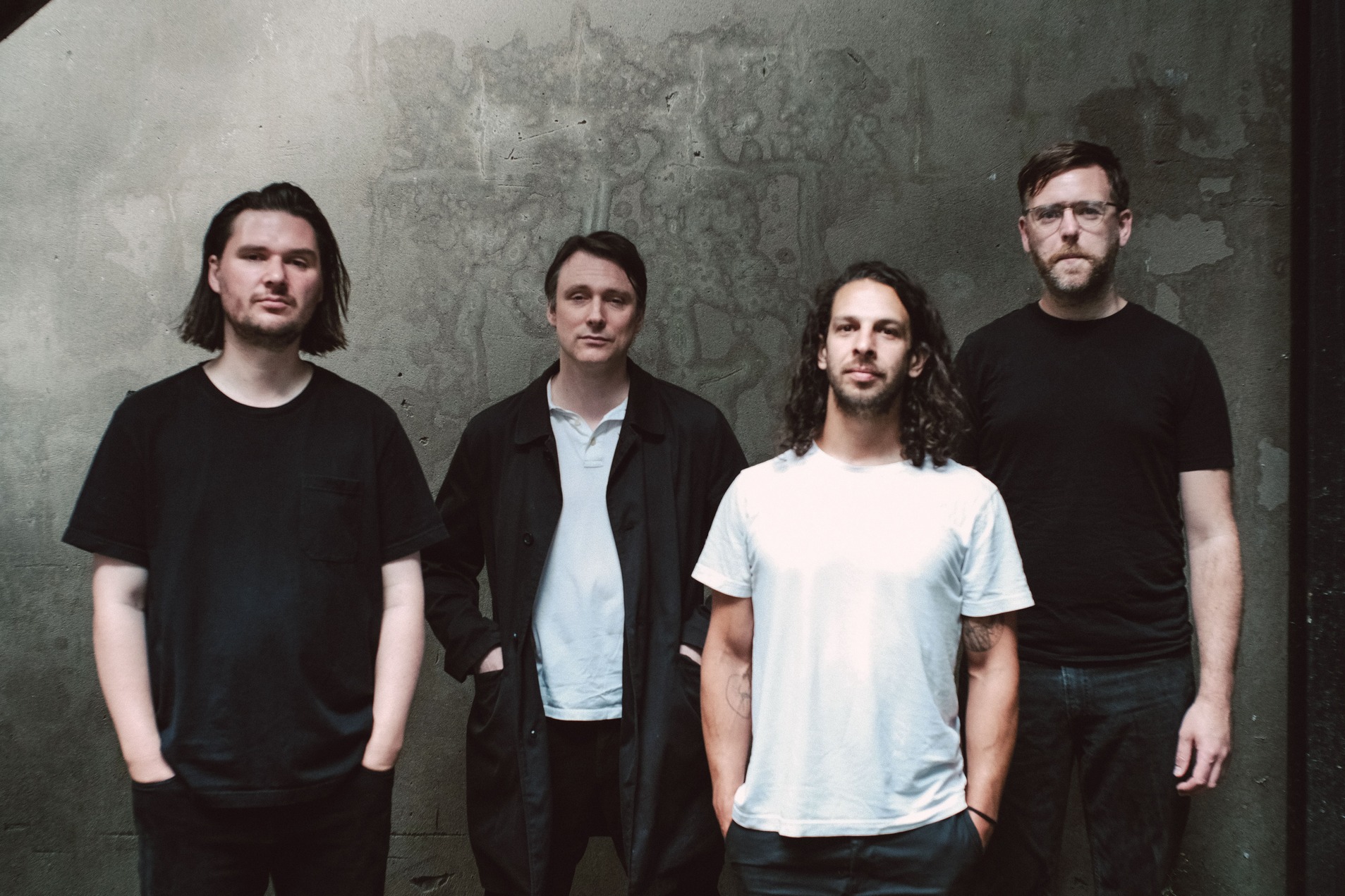Next Friday, March 15, Belfast jazz-punk band Blue Whale return with their highly-anticipated second LP, Last Immediate Images. The follow-up to 2018’s Process, it’s another masterfully shapeshifting leap forward from one of the island’s most fiercely unpigeonholeable bands.
Recorded and produced by Gilla Band’s Dan Fox, the album is a remarkable expansion, and deft deconstruction, of what the Quietus once hailed as their “chaotic, yet controlled experimental rock.”
Ahead of its release, Cathal McBride spoke with guitarist Ben Behzadafshar about prolonged experimentation, the magic of biding one’s timing, being ‘sound carriers’ for Damo Suzuki and more.
Blue Whale launch Last Immediate Images at the Black Box in Belfast on Friday, March 15.
Go here to buy tickets and here to pre-order the LP
Congratulations on the new album. It’s been just over five years since your debut album Process, was this break deliberate or more down to external factors like the pandemic?
The break was partly due to the pandemic, but we have also always worked at a somewhat leisurely pace. Our songs tend to take a long time to write and we all have jobs, families, other projects to focus on, but working at this pace has made Blue Whale sustainable for all of us and is one of the reasons we’ve managed to keep going as long as we have.
Is it hard to restart your momentum after such a long break or was it helpful to take some time off and refresh?
I think having a break from creating together made us appreciate being able to do it again. We are fortunate to have a practice space in Vault Artist Studios, so it’s easy for us to go in and plug in and start playing, and we were excited to do this after things opened back up. We then received Arts Council funding to make the record and that was the kick up the arse we needed to start writing new songs and honing some old ones.
How did the writing process for the new album differ from the first?
For some of the songs (like ‘Otic Brawl,’ ‘Carpet Man,’ ‘Orunge,’ ‘Reimer’) the writing process was similar to how we had worked previously – usually starting with the two guitars and then fleshing things out with the rhythm section, but we tried some new things this time too.
For ‘Eddie the Ombraphobe,’ ‘8 Acres,’ ‘Twenty-two’ and ‘Fourty-Four ‘we worked on some things in isolation and came back with new ideas. There’s a soundscape of pots and pans, primitive smartphone keyboards, and ambient free jazz drumming; sounds of guitar strings tied to a practice room shelf, banging on the shelf and then manually adjusting the pitch with a whammy pedal; a piece with hundreds of single notes that sound like chords that would be physically impossible to play on guitar; and a load of different loops we gave our producer Dan free reign to knit together.
We also reworked ‘Saint of Florists’, which was written for a live score we performed for the Belfast Film Festival. The film focused on pre-troubles architecture and the brief was ‘utopian and nostalgic’. It is a lot gentler than anything we have done before and really pushed us out of our comfort zone, but we enjoyed the process and are proud of the results. Similarly, ‘I Wanna Be Your Da’ has been kicking around for a while, but we took it apart and put it back together for the album.
As a band renowned for your live shows, does it ever feel difficult to capture your live sound faithfully on record?
It can be, but, with the help of the producers we have worked with, we feel we’ve gotten better at this over the years. We use more effects and distortion in our songs now, which can immediately increase the sonic intensity we have always tried to harness in our live shows. We also live track the drums in attempt to keep the swagger of a live rendition. Apart from our second EP, we haven’t recorded to a click.
You recorded this album with Gilla Band’s Daniel Fox, he’s become an extremely in-demand producer on the Irish scene and beyond. How was it working with him, and what do you think it is about his production style that has so many artists flocking to him?
It was a brilliant experience working with Dan. It felt like he understood what we were trying to achieve and whilst not being overbearing, always had useful ideas as to how we could improve things. We trusted his opinion if we ever arrived at an impasse when making decisions about songs. He also had the patience to try out ideas we had – a prolonged experiment attempting to manufacture a gong sound for ‘Otic Brawl’ comes to mind. He brought out a few insane pedals too. It is no surprise people want to work with him given the unique sound he and Gilla Band have been conjuring the last while. He is also a really nice fella.
Descriptions of Blue Whale’s music often vary from ‘math-rock’ to ‘jazz-punk’ and even ‘experimental party band’. Is it important to you not to be a band that’s easily pigeonholed, and has your view of what kind of band you are changed in any way over the years?
It has always been important to us that we did not fall into the trappings of instrumental guitar music. We actively try not to sound like most ‘math’ or ‘post’ rock bands and whilst we have a ‘sound’ that runs through our catalogue, we try as best we can to keep exploring different ways of playing and to bastardise different genres. We’re really proud of the variety of sounds and moods on the new record. I think a big change in recent years is the confidence we now have to build on a single idea and trust that it is strong enough to hold as an interesting song. In the past we might’ve been a bit nervous to stay too still, or be too obvious, and often felt like we needed to keeping moving the song from one place to the next. It felt like we were running away from something. We love that this is still part of who Blue Whale are, but it feels good to sometimes choose not to do this.
We heard the sad news recently that Damo Suzuki from Can passed away. You and Paul Stapleton got to be his backing band – or ‘Sound Carriers’ – in the Black Box back in 2017. How was the experience of playing with him that night, and how much had he and Can influenced your music before and after that experience?
Even that Damo replied to our initial email was extremely exciting for us. Being on stage and looking up and seeing that he was also there was completely surreal and a bit overwhelming. As it was all improvised, at sound check we didn’t know what the hell to do, but it seemed it was just another day at a different office for him. We jammed for about 90 minutes straight; long enough to habituate and take in what a special thing it was to be taking part. Can were a big influence for us and it was one of the best things we have done as a band and as individuals. We were really sad to hear of his passing and felt so privileged to have been part of his network.







